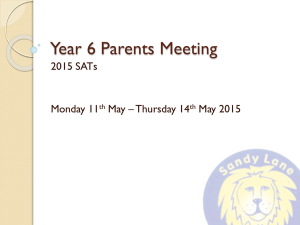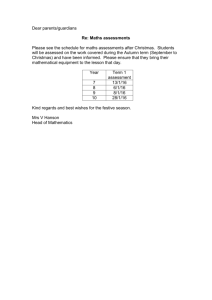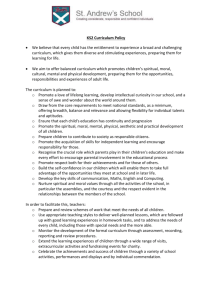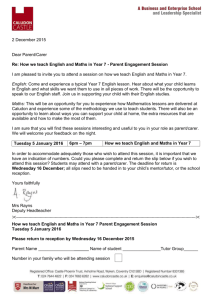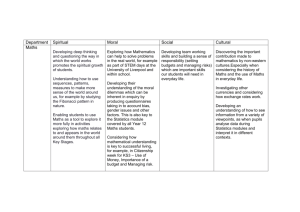Homework Policy Sept 2015
advertisement
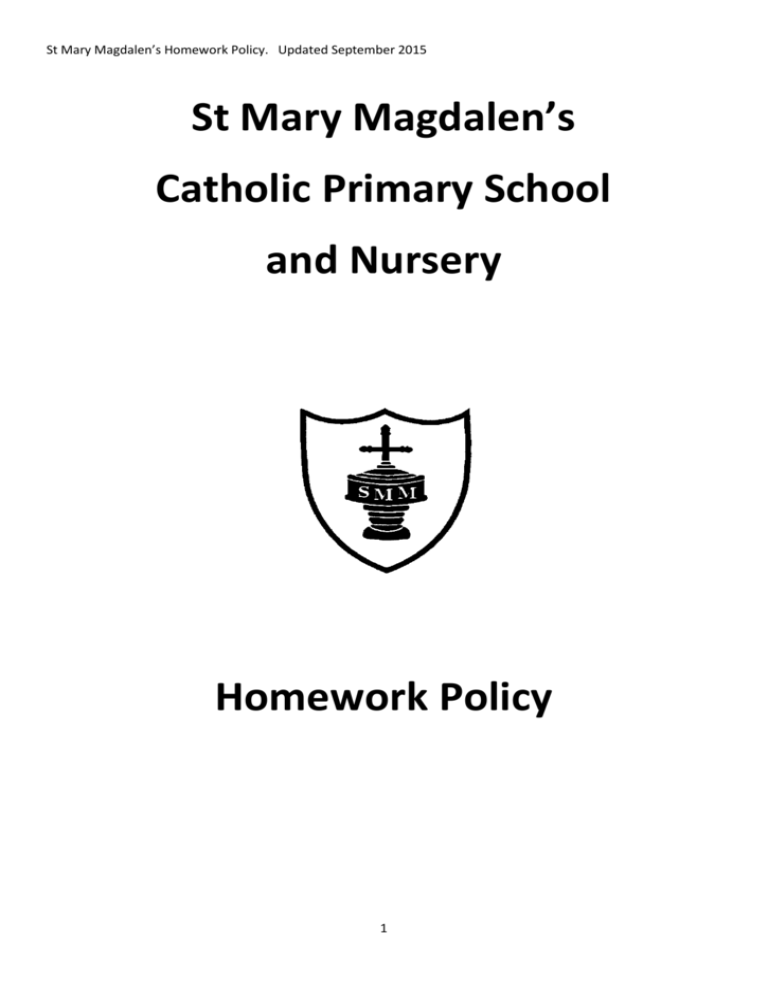
St Mary Magdalen’s Homework Policy. Updated September 2015 St Mary Magdalen’s Catholic Primary School and Nursery Homework Policy 1 St Mary Magdalen’s Homework Policy. Updated September 2015 St. Mary Magdalen’s Catholic Primary School We believe homework is a key aspect of learning. Homework helps children improve important skills. We believe that homework is a valuable opportunity for children to share with their parents/ carers things they have been doing at school. Through our policy we aim to: • Ensure a consistent approach across the school • Ensure progression towards independence and individual responsibility • Ensure parents/ carers can support their child more effectively • Extend and support learning • Provide opportunities for parents/carers and children to work in partnership and enjoy learning experiences Homework will focus on the whole school priorities for that academic year 2015: 1. Fostering a love of reading 2. Developing maths skills and their application to real life situations We believe reading is a key aspect of developing a child’s learning. We value parents and carers reading with and to their children because it allows them to enjoy texts they might not be able to read alone, therefore improving many key skills which enable a child to access the wider curriculum. English and Maths skills across the curriculum We use a set of progressive spelling sheets throughout school to support a personalised spelling programme, related to New Curriculum year group expectations. English will be set to support both reading and writing skills. Maths will be set to develop mental maths and problem solving activities. It will also consolidate skills taught in class. Parents can support their child to develop fast recall of number bonds to 10 and 20, then 100, and then tables to 12 x. Learning ‘X Tables’. By Year 4 children are expected to be able to recall all their tables. To help support this learning, the following targets are in place: Year 1, children are expected to know the 2x, 5x and 10x tables. Year 2, know 2x, 5x, 10x AND they should also know 3x tables. Year 3, should know 2x, 5x, 10x, 3x AND 4x and 8x tables. Year 4 children know and can recall ALL times tables facts. We suggest that children are encouraged to play ‘tables’ games, chant tables as they walk and sing them too… It is also valuable to develop skills in real life contexts so children make links with their learning e.g. cooking to develop maths skills relating to weight, using time tables for trains and buses, telling the time, finding focused sight words in books/ magazines/ newspapers. Improving key life skills As a school, we focus on and celebrate the following 5 key skills: Questioning, Teamwork, Creative Thinking, Persevering and Communication. Social skills, evaluation skills, problem solving, managing feelings and working collaboratively are key life skills. Developing key life skills improves children’s motivation and approach to life and learning. Working together as a team/ sharing/ communicating feelings develops a confident child who has no fear of getting things wrong or having a go! Activities/ games/ helping around the house can develop maths and English skills but also vital life skills and are fun too! 2 St Mary Magdalen’s Homework Policy. Updated September 2015 For example: Board games - Playing scrabble is a great way of learning to spell but also teaches turn taking, solving problems, losing! The game ‘Articulate’ develops children’s vocabulary and speaking and listening skills. - Card games are great for developing mental maths, independence, patience! - Dominoes are a great way to learn number bonds. Aims of homework: • Consolidate and extend learning • Practise skills • Rehearsal • Preparation • Positive parent/ child time. Homework may be set to support a specific and identified need in comprehension, tables or number bonds, sentence work, handwriting or grammar. These will be specific, and time limited. 3 St Mary Magdalen’s Homework Policy. Updated September 2015 The Governing Body: • Delegated powers and responsibilities to the Curriculum Committee and to Role of Governing Body the Headteacher to oversee the development of this policy; • Responsibility for the effective implementation, monitoring and evaluation of this policy. The Headteacher will: • Promote this policy by raising its status and importance; Role of the Head teacher • Ensure that homework is built into teachers’ planning; • Provide supportive guidance for parents; • Keep up to date with new developments with regards to homework; • Monitor and evaluate this policy. Teachers must: • Integrate homework into their planning; Role of the teachers • Give homework out on Monday for children to return completed on Friday (unless a take-away task/project is set for an extended period of time); • Set interesting tasks and activities; • Set homework appropriate for each child; • Explain when, what and how the work is done so that each child clearly understands; • Provide opportunities for sharing of homework tasks in class and provide feedback. • Ensure all homework tasks are marked. From time to time, teaching assistants may share in the marking of shorter tasks, e.g. spellings, reading records etc. but teachers will mark extended tasks. Role of the parents/carer Role of the children Parents/ carers are asked to: • Support the homework set; • Read with your child and make a note in the reading record book; • Support the school in explaining to children that homework is valued and aids learning; • Encourage pupils and praise them when homework is completed; • Be actively involved in the homework of your child; • Make the experience pleasurable; • Discuss, encourage and praise; • Contact the class teacher/ school if you are not sure of some aspect of the homework or your child is experiencing difficulty doing it; • Contribute to the school parent questionnaires so the school can monitor the effectiveness. Children are asked to: • Complete their homework and hand it in on time; • Listen carefully in class to make sure they understand what is asked of them; • Contribute to pupil interviews and pupil questionnaires on homework for the school to monitor and evaluate; • Make sure they get feedback for their homework; • Complete homework using appropriate writing materials; • Have a go at all homework activities. 4 St Mary Magdalen’s Homework Policy. Updated September 2015 GUIDANCE AND STRUCTURE: YEAR GROUP Recommended Develop a love of weekly time reading Consolidate basic maths skills/Applying and using maths skills in real contexts Creative Topic Work The type of activities sent home for homework will be focused on developing our school key skills – Questioning, Teamwork, Creative Thinking, Persevering and Communication. EYFS 25 minutes Reading - 5 minutes x 5 with an adult. Books changed: at least 2x weekly. 1 book to share with an adult and 1 book to read independently. Year 1 60 minutes Reading - 10 minutes x 5 Maths activity or English RE work linked to ‘come with an adult. Books activity and spellings. and See’. changed twice weekly. Maths Games given out on Friday to use over Occasional ‘Show and the weekend. Tell’ preparation or Year 2 60 minutes Reading - 10 minutes x 5 Maths activity or English topic research. Family projects with an adult. Books activity and spellings. changed twice weekly. Maths Games given out Playing board games on Friday to use over Practical Maths the weekend. Activities: Year 3 90 minutes Reading - 10 minutes x 5 Weekly: maths activity Money – counting, and Where possible with an 20 minutes. English shopping / calculating Year 4 adult. Books changed activity 20 minutes. the change, currency regularly. Weekly spellings. Maths Games given out conversion Upper KS2. on Friday to use over Cooking- measuring and the weekend. (Y3 only) weighing, calculating Year 5 120 minutes Reading - 10 minutes x 5 Weekly: maths activity cooking times. Upper and Parents are requested 30 minutes. English KS2 calculating total Year 6 to hear their child activity 30 minutes. weight, using scales ‘performance read Weekly spellings. accurately. aloud’ on a regular basis as a standalone skill. Telling the time- KS1 Books changed o’clock, half past, regularly. quarter to and past KS2 5 min / 1 min accuracy. Using timetables for travel. Calculating time intervals between TV programmes, bus, train and car journeys. 5 St Mary Magdalen’s Homework Policy. Updated September 2015 Organisation: • A homework bag/pack will be given out by the class teacher and communicated by letter at the whole class parents meeting at the start of the year. • Homework will be based in one book. • The teacher will provide clear instructions each week, where relevant, and will be glued into the homework book for reference. • Homework guidance and reading guidance will be attached to the homework book for reference. • Useful information of age related resources such as websites/ games/ good reads! • The weekly spellings will be completed in the back of homework books so that parents can see how their child is performing. Equal Opportunities and Additional Needs Homework activities will be differentiated, where appropriate, to ensure the needs of pupils are best met. Work/ projects produced by children is valued and celebrated through display, discussion, assemblies. What will happen if children don’t complete their homework? If a child has difficulty with the work, then we would expect them to ask for support from the class teacher before the due date to ensure they are able to complete the work, or alternative work can be given. This is useful information as it informs the teacher about the independent capabilities of the child. The expectation is that children will complete their homework. However, if for any reason children are unable to complete their homework, parents or carers should provide the class teacher with a note or contact the class teacher explaining why the homework has not been completed on the day that the homework was due to be returned to school. Teachers will keep records of children completing homework and these records will be checked on a regular basis. A comment will be made on the child’s termly report. There may be occasions where the child will miss some playtime or lunchtime, if they have not completed homework. Monitoring the effectiveness of this policy: The effectiveness of this policy will be reviewed annually or when the need arises, and the necessary recommendations for improvement will be made to the governors. This policy was agreed by Staff and Governors Sept 2015 and will be renewed annually. Date: September 2015 Signed: H. Eady (Headteacher) 6
